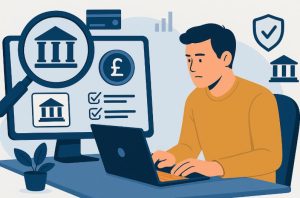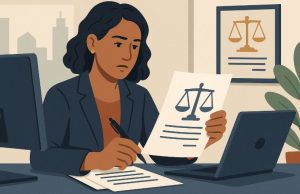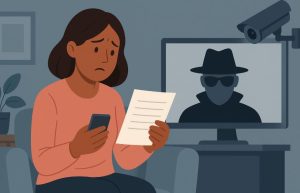Imagine waking up one morning to a letter from the Department for Work and Pensions (DWP), stating that your benefits are being reviewed due to irregular financial activity. You’ve done nothing wrong, and your money is meant to cover essential care needs.
Still, you’re now caught in a system that sees you as potentially fraudulent before you’ve had a chance to speak. This is not fiction; it’s the new reality that millions in the UK may face as the government prepares to roll out sweeping new bank account surveillance powers.
This article offers a comprehensive, easy-to-understand breakdown of what these changes mean for claimants, especially those receiving Universal Credit, Pension Credit, or ESA, and why this shift is attracting intense scrutiny across the UK.
What Is the DWP Bank Account Monitoring Plan?

The Department for Work and Pensions has proposed a plan that would significantly expand its authority to monitor claimants’ bank accounts, as part of its anti-fraud agenda.
These new powers are enabled through the Public Authorities (Fraud, Error and Recovery) Bill and the Data Protection and Information Bill, both making their way through Parliament in 2025.
Key Components of the Plan
- The government intends to begin implementing these measures from January 2026.
- A “test and learn” phase will be used to refine the system and ensure it’s implemented fairly.
- The powers allow the DWP to request and analyse financial data from banks about individuals receiving means-tested benefits.
- The initial focus will be on Universal Credit, Pension Credit, and Employment and Support Allowance (ESA), which have been identified as having higher levels of fraud or error.
How It’s Structured?
| Aspect | Description |
| Bill Introduction | January 2025 |
| Implementation Phase | Starts in January 2026 |
| Methodology | “Test and learn” with industry collaboration |
| Oversight | Codes of Practice, stakeholder consultations |
| Data Access Scope | Bank account indicators only, not full transactions |
The measures aim to allow the DWP to prevent overpayments, detect fraud, and verify eligibility criteria for those receiving benefits, all under the banner of protecting taxpayer money.
Resource: https://www.birminghammail.co.uk/news/cost-of-living/dwp-announces-exact-month-bank-31655216
Why Is the DWP Checking Bank Accounts?
The stated purpose behind this measure is fraud prevention. The UK government reports billions of pounds are lost each year through fraud and error in the welfare system.
The DWP claims that these powers are necessary to detect incorrect claims, reduce debt, and ensure that benefits are going to those who truly need them.
Fraud Prevention or Mass Surveillance?
On paper, it sounds justifiable: use banking data to flag irregularities and crack down on fraudsters. But critics argue that this measure inverts the principle of innocence until proven guilty, with potentially dangerous consequences.
Core Justifications
- Preventing benefit fraud and error
- Ensuring accurate entitlement assessments
- Saving public money
- Recovering wrongly claimed benefits
However, legal experts and campaigners believe these justifications may not outweigh the risks. With PIP fraud estimated at just 0.2%, the argument that mass surveillance is a proportionate response is increasingly being challenged.
How Will the Bank Account Checks Be Carried Out?

Contrary to some fears, the DWP will not gain unrestricted access to your transaction history or be able to monitor your every purchase. The system is being designed to flag indicators, not read statements.
How It Works?
- Banks will share limited data such as balance thresholds or frequent large deposits.
- If criteria suggest potential fraud, the DWP may open an investigation.
- This information could include account ownership, balances, savings above thresholds, and unusual income patterns.
- Transaction data is not permitted to be shared.
Checks May Include
- Excess savings above £16,000 for Universal Credit eligibility
- Repeated deposits not declared in benefit claims
- Evidence suggesting shared income in joint accounts
Table: Current vs Proposed Powers
| Criteria | Current Law | Proposed Law (2025 Bill) |
| Requires suspicion of fraud | Yes | No |
| Access to account balance | Case-by-case | Through flagged indicators |
| Transaction monitoring | Not allowed | Not allowed |
| Mass account scans | No | Yes, via algorithmic trawling |
| Consent required | Yes, in most cases | Not explicitly for flagged data |
This method of pre-emptive scanning raises serious ethical and legal concerns about mass surveillance, especially when the technology may generate false positives.
Can the DWP Check My Bank Account Without Permission?
Under the current system, the DWP needs reasonable suspicion to access your bank records. But the new legislative proposals would allow automated flagging systems to initiate investigations without your consent.
Understanding Consent and Data Access
- The DWP won’t directly access individual accounts, but will rely on banks to flag anomalies.
- Once flagged, the DWP can request more detailed data under anti-fraud laws.
- Banks may face penalties for oversharing, which acts as a safeguard.
What Changes Under the New Bill?
- Banks no longer require specific suspicion to flag a person.
- Algorithms will analyse patterns across millions of accounts, identifying individuals who may be inadvertently breaching rules.
- This includes errors, not just fraud.
Legal experts from Matrix Chambers argue that the absence of proper safeguards could make the use of such powers unlawful under privacy laws.
Who Will Be Most Affected by These Checks?

The most pressing concerns relate to the impact these measures may have on disabled people, carers, and those managing complex financial arrangements.
Disproportionate Effects
- Disabled individuals may hold separate accounts for social care funds, which could be misinterpreted as undeclared savings.
- People with psychiatric conditions may be severely affected by the anxiety of constant surveillance.
- Many may face unwarranted interviews, benefit suspensions, or prolonged investigations.
Key Statistics
- 6.3 million disabled people could be affected
- Estimated error rate of 1% across 20 million accounts could wrongly flag 200,000 people
- Fraud rate for PIP: just 0.2%
- DWP underpaid £60 million in PIP due to its own mistakes in 2022-23
Campaigners warn that the new powers may cause psychological harm and financial instability for innocent claimants, creating a hostile environment within the welfare system.
What Are the Risks of False Positives and Data Misuse?
Automated scanning is never foolproof. A single out-of-pattern transaction could trigger an alert, pushing someone into a lengthy investigation.
Potential Outcomes of False Positives
- Loss of benefits while the DWP investigates
- Unjust accusations of fraud
- Increased emotional distress
- Delayed access to food, medication, or housing
Impact of 1% Error Rate
| Accounts Scanned | Estimated Error Rate | False Positives |
| 20 million | 1% | 200,000 |
| 10 million | 1% | 100,000 |
| 5 million | 1% | 50,000 |
The collateral damage of such errors can be devastating, especially when the system doesn’t afford quick recourse or support for falsely accused individuals.
What Do Legal Experts Say About These Powers?

Legal professionals Dan Squires KC and Aidan Wills argue that the proposed changes may not stand up to legal scrutiny.
Concerns from Matrix Chambers
- Monitoring without suspicion contradicts principles of proportionality
- Lack of safeguards makes legal justification shaky
- Risk of disparate impact on disadvantaged communities
Their conclusion was clear: without explicit protections, the DWP’s expanded surveillance might not comply with domestic or international law.
Especially troubling is the proposal to apply powers not just for fraud, but for errors, including DWP’s own administrative mistakes.
When Will DWP Bank Checks Start and Which Benefits Are Affected?
As confirmed in recent DWP factsheets, the rollout of these measures is scheduled for early 2026, starting with a trial implementation phase.
Affected Benefits
- Universal Credit
- Pension Credit
- Employment and Support Allowance (ESA)
These benefits have been identified as having the highest levels of fraud and error, though many campaigners dispute this characterisation given the low verified fraud rates.
What Can You Do If You’re Affected by DWP Surveillance?

If you’re receiving benefits, it’s vital to understand your rights and what actions to take if you’re wrongly flagged.
1. Stay Informed
- Read official DWP factsheets and updates.
- Know your eligibility criteria and report any changes in circumstances.
2. Keep Records
- Maintain clear documentation of your financial transactions.
- Ensure your bank accounts are consistent with your benefit claims.
3. Get Legal Help
- Seek advice from benefits advisors or legal aid groups if contacted by DWP.
- Know that you can challenge false accusations and appeal decisions.
4. Raise Your Voice
- Support civil campaigns such as Big Brother Watch.
- Share your experience if wrongly investigated to bring public awareness.
Conclusion
The UK welfare system is undergoing one of its most significant transformations in decades. With the 2025 Bills set to introduce sweeping new surveillance powers to monitor bank accounts, the balance between fraud prevention and civil liberties hangs in the balance.
While stopping fraud is a legitimate goal, critics argue that the current approach is invasive, poorly targeted, and risks punishing the very people the system is meant to support. Vulnerable individuals, especially disabled claimants, could bear the brunt of a system that assumes guilt before offering justice.
As we approach 2026, it’s vital that citizens stay informed, speak up, and ensure their voices are heard in the decisions shaping this new welfare landscape.
FAQs
What is the Public Authorities (Fraud, Error and Recovery) Bill?
It’s a legislative proposal that gives the DWP enhanced powers to monitor benefit claimants’ bank account data to combat fraud and error.
Will the DWP see my spending details?
No, the DWP will only receive limited data from banks, such as balances or deposit patterns, not detailed transaction histories.
When will DWP start monitoring bank accounts?
Implementation begins in January 2026, with a test and learn approach initially.
Which benefits are first to be monitored?
Universal Credit, Pension Credit, and ESA are the first to be affected due to higher fraud and error levels.
Can I be flagged even if I’ve done nothing wrong?
Yes, due to automated scanning, false positives may occur even when there’s no fraudulent activity.
How can I protect myself if I’m wrongly flagged?
Keep clear records, understand your rights, and seek legal advice if contacted by the DWP.
Are these powers legal under current privacy laws?
There are serious legal concerns, and experts argue the measures may breach privacy rights protected by UK and European law.









